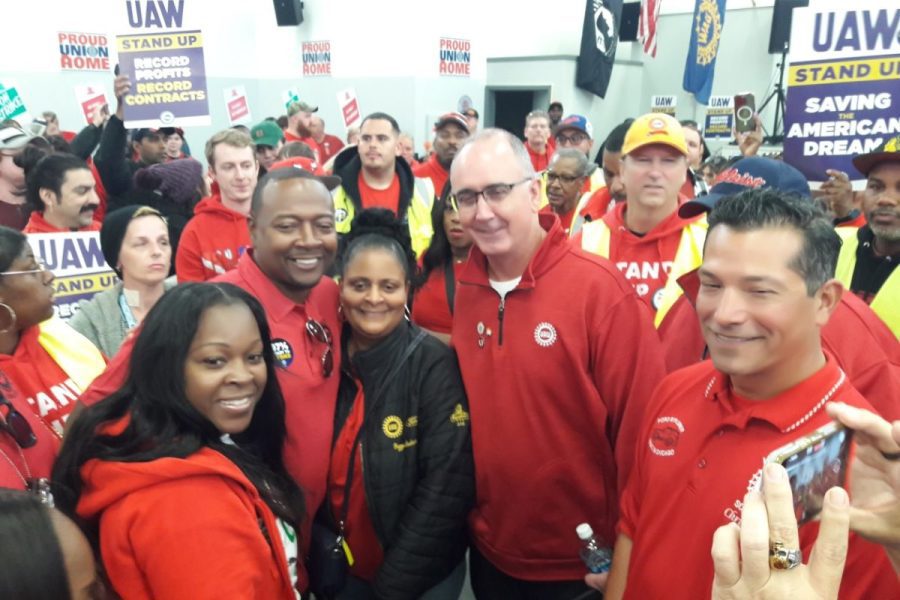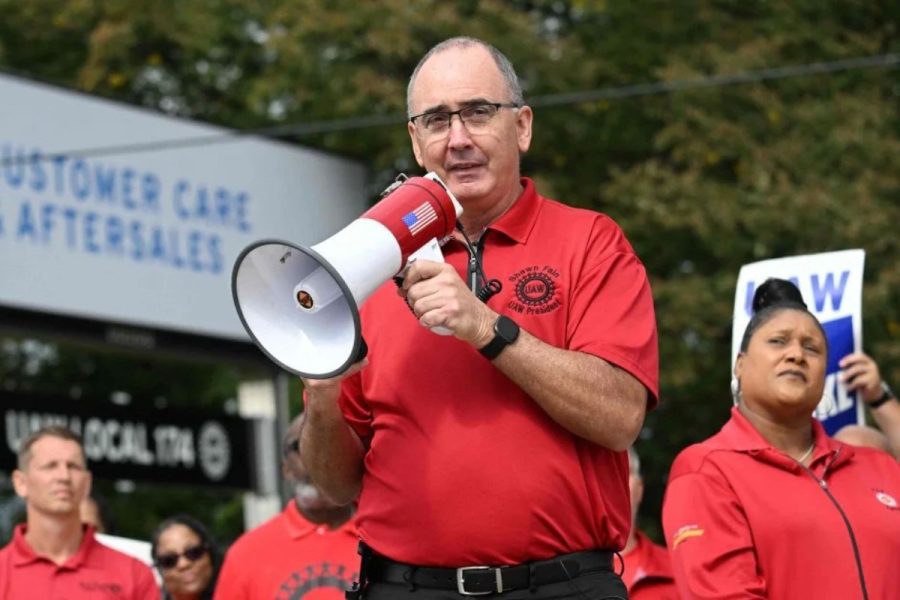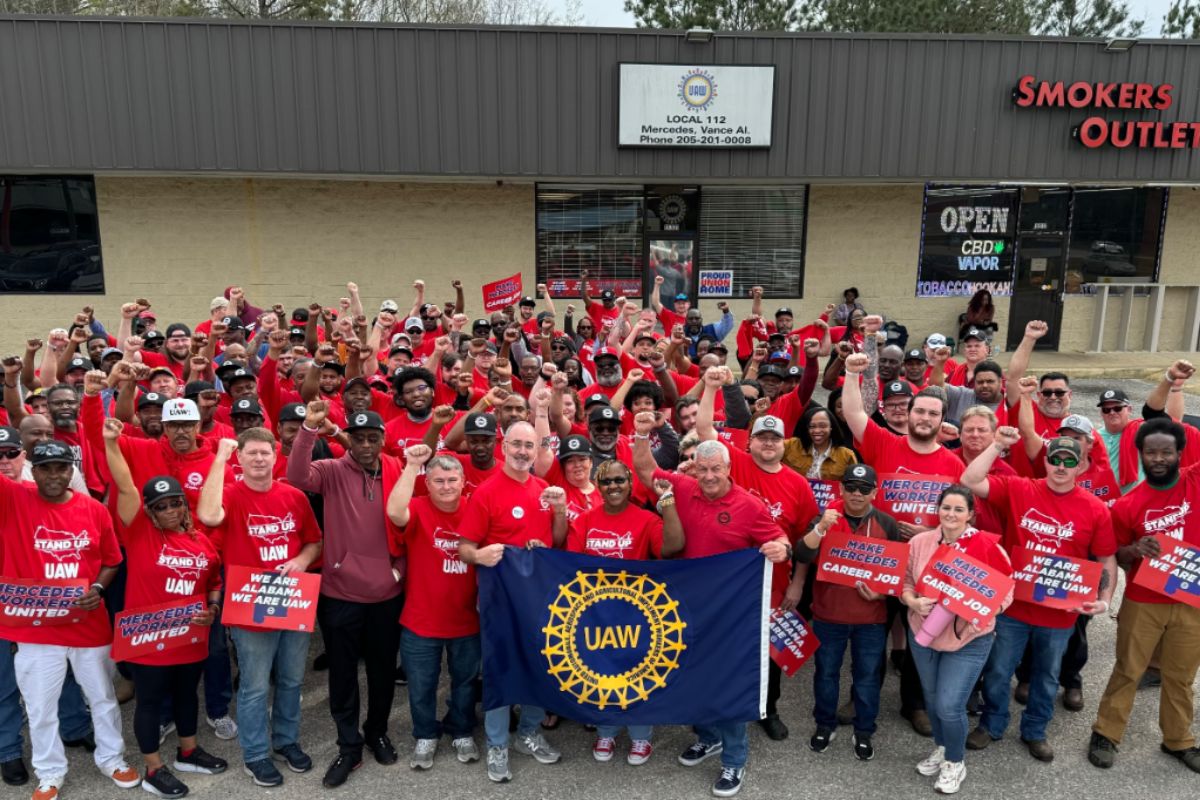UAW President Visits Alabama Mercedes: UAW President Shawn Fain, along with Region 8 Director Tim Smith, visited Alabama’s Mercedes-Benz plant, showcasing the union’s commitment to organizing efforts in the state’s automotive industry. The meeting at the UAW union hall in Coaling facilitated direct engagement with workers.
Fain’s leadership during the 2023 strike highlights his experience and determination, signaling a strategic push to expand the union’s influence. The union’s substantial $40 million funding pledge over two years aims to target non-union workers in Southern states, including those in auto and electric battery sectors, reflecting a shift in the labor landscape that could have significant implications.
UAW President Visits Alabama Amid Organizing Efforts
During a recent visit to Alabama, UAW President Shawn Fain, accompanied by Region 8 Director Tim Smith, emphasized the union’s commitment to organizing efforts at the state’s auto plants. This visit marks a significant step in the UAW’s push to unionize workers in the region.
Meetings held at the UAW union hall in Coaling provided a platform for Fain to connect with workers directly and reiterate the union’s dedication to supporting their interests. Fain’s leadership, demonstrated during the 2023 strike against major American automakers, where significant gains were achieved for workers, underscores his experience and determination in advocating for labor rights.
The presence of both Fain and Smith in Alabama signals a strategic focus on expanding the union’s reach within the auto industry in the state. By engaging with workers on the ground and reaffirming the UAW’s commitment to their cause, the visit sets a precedent for continued organizing efforts and solidarity within the workforce.

ALSO READ: Alabama Gambling Bill Stalls as Lottery Jackpots Rise
Union’s Ongoing Campaign and Funding Commitment
With a funding commitment of $40 million over the next two years, the UAW’s ongoing campaign targets non-union auto and electric battery workers, particularly focusing on the Southern states. This significant investment underscores the union’s determination to expand its reach and influence in the region. In an interview with Car and Driver, UAW President Fain expressed optimism about the campaign’s progress, drawing parallels to the successful unionization efforts with the Big Three automakers in the United States.
The UAW’s executive board’s allocation of substantial funds reflects a strategic approach to bolstering organizing efforts among workers in key industries. Recent developments indicate promising advancements, with notable percentages of employees at major plants, such as Mercedes-Benz’s Vance facility, Volkswagen’s Chattanooga plant, and Hyundai’s Montgomery plant, showing interest in union representation by signing union cards. This growing support signals a potential shift in the labor landscape of the Southern automotive sector and highlights the UAW’s commitment to advocating for workers’ rights and fair labor practices in the industry.
Challenges and Historical Context
The persistence of historical resistance to unionization in the Southern automotive sector poses formidable challenges to the UAW’s current campaign efforts to secure widespread support among workers in key industries. Despite recent organizing endeavors signaling progress, the region’s historical patterns of anti-union sentiments have proven to be obstacles.
Past initiatives to unionize at the Tuscaloosa County plant and in Chattanooga have faced setbacks, highlighting the deep-rooted challenges faced by labor organizers. Bloomberg’s report on MBUSI CEO Michael Göbel’s skepticism towards the advantages of unionization further underscores the complexities the UAW confronts in its endeavors.
Nevertheless, the UAW remains resolute in its approach, steadfast in its goal to amass majority backing from workers and ultimately obtain formal recognition. This commitment reflects the union’s determination to advocate for improved terms and conditions of employment on behalf of its members, maneuvering through the intricate historical context of the Southern automotive industry.

News in Brief
UAW President Shawn Fain and Region 8 Director Tim Smith visited Alabama’s Mercedes-Benz plant, reaffirming the union’s commitment to organizing efforts in the state’s automotive industry. Meetings at the UAW union hall in Coaling facilitated direct engagement with workers, highlighting Fain’s leadership during the 2023 strike.
The union’s substantial $40 million funding pledge over two years targets non-union workers in Southern states, aiming to expand influence in auto and electric battery sectors. Despite historical challenges, recent support from employees at major plants signals progress in the UAW’s campaign for worker rights and fair labor practices in the Southern automotive sector.
Our Reader’s Queries
What does UAW stand for?
The International Union, United Automobile, Aerospace, and Agricultural Implement Workers of America, commonly referred to as the United Automobile Workers (UAW), is a prominent American labor union. It advocates for workers across the United States, including Puerto Rico, as well as in Canada.
How did the UAW start?
At the 1935 AFL convention, a caucus of industrial unions spearheaded by John L. Lewis established the Committee for Industrial Organization (CIO) within the AFL. However, within a year, the AFL suspended these unions, prompting them to form the rival Congress of Industrial Organizations (CIO), which included the UAW among its members.
Does Mercedes have a union?
The United Auto Workers (UAW) union announced on Tuesday that a majority of hourly workers at a Mercedes-Benz factory in Alabama have signed cards expressing their intent to join the union.
Is Tesla a UAW?
As of January 2024, Tesla remains the sole major American auto manufacturer without union representation in the United States. Despite multiple efforts by unions such as the United Auto Workers (UAW), United Steelworkers (USW), International Brotherhood of Electrical Workers (IBEW), and Workers United between 2016 and 2023, none of the attempts at unionization were successful.

